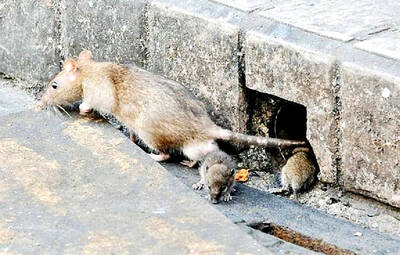China has become “short-sighted” in its dealings with Taiwan, former American Institute in Taiwan (AIT) chairman Richard Bush told a Harvard conference.
The nation’s “relative marginalization” was not due to anything idiosyncratic about Taiwan, but rather how China has pursued its long-standing political goal of unification, he said.
Addressing a conference on Taiwan’s role in East Asia, Bush, who is now director of the Center for Northeast Asian Policy Studies at the Brookings Institution, said that China has become the center of a truly regional economy.
He said that a “noodle bowl” of free-trade agreements and other preferential arrangements had emerged in East Asia, but that Taiwan had been excluded.
There was a fear, Bush said, that growing economic interdependence with China would lead Taiwan to “slip inexorably into China’s political control.”
He said the Chinese Nationalist Party (KMT) has normalized, liberalized and institutionalized cross-strait economic relations, while the Democratic Progressive Party (DPP) has been “reserved” about interdependence with China.
Bush said that he believes the administration of President Ma Ying-jeou (馬英九) has the better approach.
“It understands that trade liberalization is necessary, not just to provide better and equal market access, but also to stimulate structural reform and change the status quo of Taiwan’s economy,” he said.
“The Ma administration has judged that Taiwan will have a chance to do liberalization with Taiwan’s other trading partners only if it does liberalization with China first, because Beijing will use its political clout to get those other trading partners to refuse to liberalize with Taiwan,” he said.
Bush said the DPP says that such “sequencing” is unnecessary.
There is a need, he said, to address concerns that economic interdependence is a slippery slope to political subordination.
“There is a slope, but it doesn’t have to be slippery, as long as Taiwan has a good sense of its interests regarding political and security matters,” Bush said.
He said that when it comes to deterring China’s military threat or defending Taiwan against the People’s Liberation Army (PLA) attacks if deterrence fails, “the United States is the only game in town.”
“No Asian power is interested in making a significant contribution to Taiwan’s security,” Bush said.
Driving Taiwan from the international system was always a means to a higher end — to induce unification, he said.
However, for Beijing to secure voluntary consent to unification it needs a very broad consensus that it is in Taiwan’s long-term interests.
“The Taiwan public has long sought dignity in the international community, so efforts by China to deny that dignity through a policy of marginalization only fosters anti-unification sentiment,” Bush said.
He argued that the only way Taiwan can achieve long-term prosperity is to carry out multi-directional economic liberalization and that China’s efforts to block that liberalization would leave Taiwanese worse off economically.
“That is an outcome that will undermine China’s unification goals much more than the denial of dignity,” Bush said.
In that case, he said, the policy of marginalization becomes self-defeating.

The manufacture of the remaining 28 M1A2T Abrams tanks Taiwan purchased from the US has recently been completed, and they are expected to be delivered within the next one to two months, a source said yesterday. The Ministry of National Defense is arranging cargo ships to transport the tanks to Taiwan as soon as possible, said the source, who is familiar with the matter. The estimated arrival time ranges from late this month to early next month, the source said. The 28 Abrams tanks make up the third and final batch of a total of 108 tanks, valued at about NT$40.5 billion

A group from the Taiwanese Designers in Australia association yesterday represented Taiwan at the Midsumma Pride March in Melbourne. The march, held in the St. Kilda suburb, is the city’s largest LGBTQIA+ parade and the flagship event of the annual Midsumma Festival. It attracted more than 45,000 spectators who supported the 400 groups and 10,000 marchers that participated this year, the association said. Taiwanese Designers said they organized a team to march for Taiwan this year, joining politicians, government agencies, professionals and community organizations in showing support for LGBTQIA+ people and diverse communities. As the first country in Asia to legalize same-sex

MOTIVES QUESTIONED The PLA considers Xi’s policies toward Taiwan to be driven by personal considerations rather than military assessment, the Epoch Times reports Chinese President Xi Jinping’s (習近平) latest purge of the Chinese People’s Liberation Army (PLA) leadership might have been prompted by the military’s opposition to plans of invading Taiwan, the Epoch Times said. The Chinese military opposes waging war against Taiwan by a large consensus, putting it at odds with Xi’s vision, the Falun Gong-affiliated daily said in a report on Thursday, citing anonymous sources with insight into the PLA’s inner workings. The opposition is not the opinion of a few generals, but a widely shared view among the PLA cadre, the Epoch Times cited them as saying. “Chinese forces know full well that

An elderly man with underlying health conditions died in mid-January, eight days after the onset of symptoms, marking Taiwan’s first hantavirus death this year, the Centers for Disease Control (CDC) said yesterday. The man, who was in his 70s and lived in Taipei’s Daan District (大安), tested positive posthumously for hantavirus after passing away on Jan. 13 from sepsis complicated by multiple organ failure and pneumonia, the CDC said in a press release. According to the CDC, the man sought treatment on Jan. 6 for respiratory issues and low blood pressure before returning two